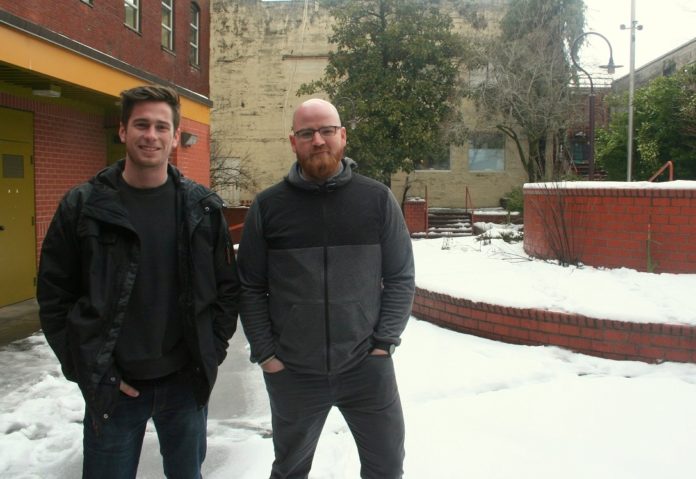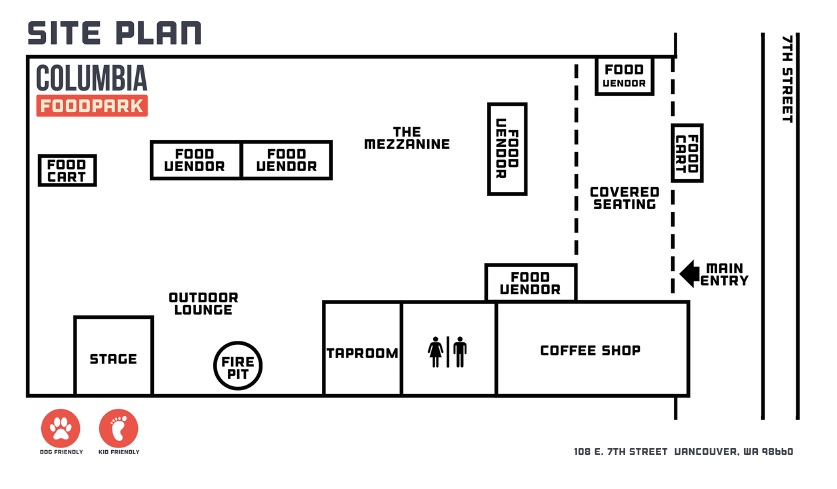
It starts with an idea… add a few shipping containers, a dash of undeveloped commercial property, mix in food vendors and equal parts collaboration and community.
What do you have?
It’s the recipe for a new kind of business incubator – one that’s coming to downtown Vancouver this year and promises to fuel the city’s growing food scene and assist up-and-coming chefs and restaurants.
Columbia Food Park (CFP), as it will be known, is scheduled to open in late April at 108 E 7th Street. The 5,000-square-foot park will be comprised of multiple shipping containers – each one outfitted with a fully-functioning kitchen, capable of being customized depending on vendor needs.
Business partners and Vancouver residents Alex Mickle and Kylan Johnson see the park as something more permanent than a food truck pod, but not as financially-intimidating to culinary entrepreneurs as a brick-and-mortar restaurant.
“If a chef was thinking about starting a restaurant, for a lot of people it’s cost-prohibitive,” Mickle said. “We do believe very strongly that we will be able to function as that graduated step. The big focus for us is to be a part of that growth and allow other businesses to be a part of that growth.”
Each 80- to 120-square-foot-container will be capable of appealing to a range of food artists, from recent culinary school graduates to established food truck owners and restaurateurs looking to test another market. CFP’s close-knit environment will allow vendors to feed off of one another’s creativity and to share ideas.
Mickle and Johnson said the food park will have a very vibrant, street style, neighborhood feel that will appeal to both visitors and residents of downtown Vancouver.
“This specific block has been fairly underdeveloped and a first reaction from other people (when they see the property) is kind of negative,” said Johnson. “We’re excited to bring light to this area and create a place that people go and hang out at.”
Currently in discussions with a number of food vendors, the business partners said multiple cuisine options will be represented at CFP, and the pair will be drawing from their relationships with area brewers to ensure a strong presence of local beers.
Approximately 700 square feet of covered space on the property will be converted into a cozy, heated seating area. Additional seating will be added in the form of bistro style tables around the site. A coffee vendor will occupy a small indoor space at the park’s entrance.

Repurposing shipping containers for this kind of use isn’t entirely new; Johnson said he modeled the concept after container parks around the globe – from Boulder, Colorado to several sites in Australia.
Mickle noted that working with shipping containers will help make Columbia Food Park a destination while also tying into Vancouver’s history as a shipyard.
As with other incubators, CFP will manage the online marketing and physical branding of each participating vendor, while building other partnerships within the community that express an interest in cross-collaboration. For example, Mickle and Johnson said CFP will become a stop along the route of downtown Vancouver’s bicycling tour company, Couve Cycle.
“One of the elements of our approach to this concept is to partner with those who bring expertise,” Johnson added. “We’re seeking mentorship in that realm.”
Though the park won’t be open for a few months, Mickle and Johnson are prepared to follow up their initial concept with a second phase that includes the installation of a bonfire space, a cordoned off area for 21 and over beer and wine service, and some dedicated seating for outdoor concerts.
The business partners plan to launch a Kickstarter campaign in early February to strengthen the financial backing of the project, and for marketing purposes as well.
Follow Columbia Food Park’s progress by visiting their website, www.columbiafoodpark.com.
Nicholas Shanmac contributed to this report.


